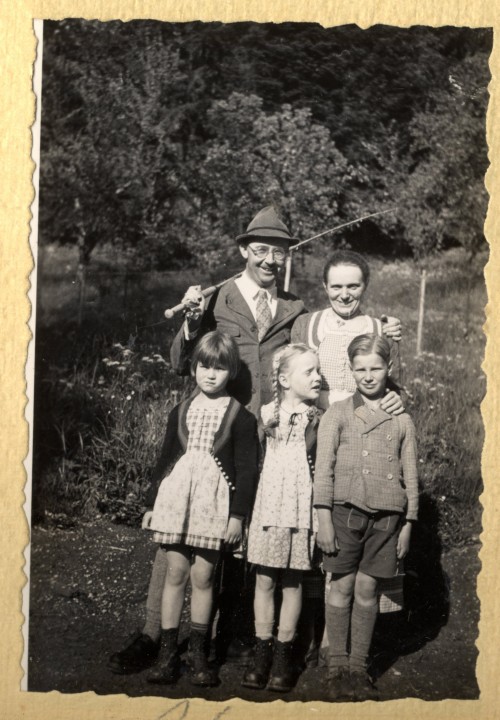 Loving others prevents no one from becoming a devil. Private goodness does not equate to public virtue. A man who loves his children, wife, friends, and dog can murder and sleep well. A woman who cherishes her children, takes care of her husband and welcomes her friends into her home is as capable of terrible deeds as any man.
Loving others prevents no one from becoming a devil. Private goodness does not equate to public virtue. A man who loves his children, wife, friends, and dog can murder and sleep well. A woman who cherishes her children, takes care of her husband and welcomes her friends into her home is as capable of terrible deeds as any man.
Heinrich Himmler loved his wife and children. His wife, Margarete, could not imagine such a good man for herself. He called her his “good, sweet little wife.” He called his mistress his “Häschen,” his bunny rabbit. He signs off one of his letters to his wife: “I’m off to Auschwitz. Kisses. Yours, Heini.” Both hated Jews. *
You already know who he is — the head of the SS, the one man most responsible for the implementation of the Holocaust, the architect of the Einsatzgruppen and the Death Camps.
He loves, and he authorizes genocide.
What elements create these individuals? Nothing simple. A brew of conditions, circumstances and character produces a Himmler and men and women like him.
A person must be resentful of the success of those he regards as inferior — in this instance, Jews, but others will fit — Latinos, African-Americans, Asians, Gypsies, Muslims, Gays, Africans. Those ‘others’ must also provoke fear — they will pollute our blood, take our jobs, steal from us, threaten us on the street, destroy our religions. From an other, a term indicating their profound alienation from us, they become an enemy. State and Corporate propaganda foster this idea of the enemy. One must fight enemies. Subdue them. Eliminate the threat. New enemies appear when the old ones have been vanquished. Enemies are essential. If they do not exist, they must be conjured out of the collective imagination.
Economic life must be difficult. Ordinary people must be engaged in a struggle for work, to pay the bills, to keep a home, to feed the family — with all of this pressure building until those ordinary people feel alone, isolated within their homes, afraid of the next day, terrified of the next year, close to despair, hoping for deliverance.
A party or a leader stokes those fears and promises respect, work, protection … revenge.
True Believers rise. Their passion and sometimes competence earns them power. Think of Himmler, Heydrich, Eichmann, Yezhov, Yagoda, Beria. Through diligence and talent, they gather more power to themselves. They may exercise that strength on the enemies. Their spineless legislatures have given them permission. The propaganda networks urge them to act. They know exactly what their leader expects. They know whom to blame, whom to hate — one might do anything to an enemy. A compliant judiciary removes impediments to action. The institutions of religion, a potential source of moral restraint, ally themselves with power. They are only needed for applause for the ideology itself has become deified. Repression is always theological in nature.
Something big happens. A precipitating ‘catastrophe’ is needed so that State and Corporate interests can sweep away those who dissent. The Reichstag Fire. The murder of Sergei Kirov. The event gives permission to hurt, not just hate.
When all of these factors combine, the beasts inside are dispatched. All manner of atrocities become possible. Pity vanishes from everyday life. The Believers reach their apotheosis in bloodletting.
However, the corollary to their exaltation almost always arrives for no one has any real protection. The charmed circle of believers is rarely static. No one can see what Shakespeare called “the mind’s construction in the face,” and thus paranoia becomes a quality of common sense. The predators eat each other.
Love is not pity. It is narrow; a reserve fitted with boundaries; an armed encampment surrounded by trenches and a staked palisade. Few are allowed entrance.
Pity is broad, inclusive, unbounded, a landscape of trees and water. It is a vision of us in another. Pity defies the isolation of the tribal heart. The idea of the the other or the enemy has no place there: “In the chaos of the world, where we carom and collide in the everyday turbulence, there’s something about the specific gravity of the helpless individual, the lost and fractured, that draws kindness from us, like venom from a wound.” **
Monsters might love but they cannot pity. To do so necessitates a conscience that must function apart from kin and clan.
Love will not save us. Pity might.
** from The Answer To The Riddle Is Me by David Stuart Maclean